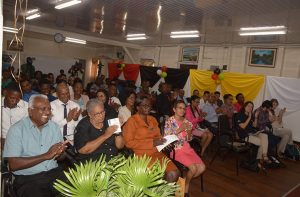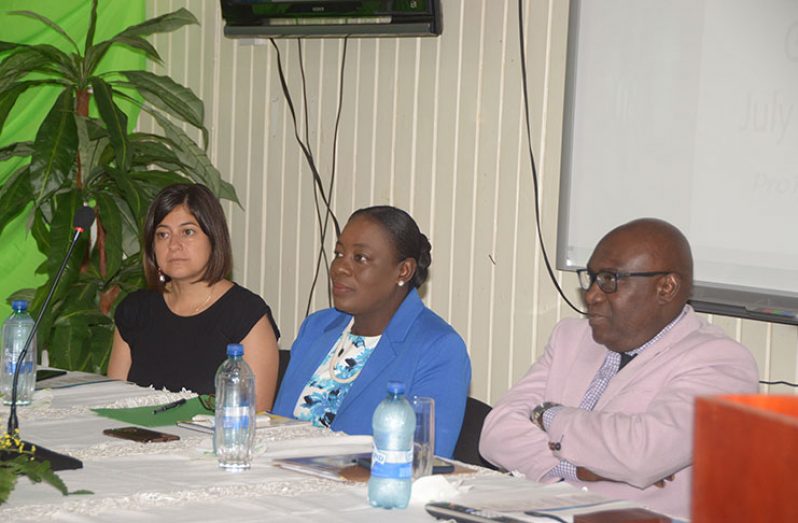– initiative to bridge technological gap between coastland & hinterland
PROFUTURO Project Guyana, the global programme that is set to improve education for over 5000 primary school pupils in remote and hinterland regions across Guyana, was officially launched on Wednesday at the National Centre for Educational Resource Development (NCERD). Guyana is the first country in the Caribbean to implement the global programme which is expected to be implemented at selected schools from September 2019.
Delivering remarks at the launch, Minister of Education, Dr. Nicolette Henry noted “We are present here today as part of a process to advance the delivery of education in Guyana. This is the type of activity that is fundamental to ensuring our citizens receive a sound education, which is fundamental to the good life we so often speak.”
“As we all know, Education is embarking on major changes to students’ learning and knowledge acquisition. For 21st century existence, young people need more than traditional skills, skills such as literacy and numeracy must be complemented with skills such as collaboration, problem solving, and creativity. Technology has influenced and changed the way students solve problems, research information and learn.”
Also at the launch was Chief Education Officer (CEO), Dr. Marcel Hutson, while representing the ProFuturo Foundation was Maria Lobo.
Over the next week, more than 400 teachers are expected to be trained by seven local instructors of Profuturo for deployment to the various regions to prepare the teachers, at the targeted schools to utilize the method beginning in the next school term. The necessary electronic teaching equipment is being provided by ProFuturo.

MoE Head of the Management Information Systems (MIS) Unit, Yoganand Indarsingh confirmed that, “The equipment should come here sometime in August so we’re going to start training sometime prior to school opening,”
At some of the schools the programme will be implemented at all grade levels, while at other schools only a few grade levels will be targeted.
“We still have to identify the specific grades because for the large schools we will not be able to run it out to all grade levels. For the large schools we may focus on a few grades but for the smaller schools, that have let’s say 50 students, we will roll it out to the entire school,” Indarsingh related.
Indarsingh highlighted that one of the greatest features of the programme is that it does not require infrastructural changes to the classrooms in order to be used.
“You don’t need a specialized classroom you could take it into any classroom even if it doesn’t have power because the tablets could be charged and are portable. A teacher could take the laptop, the tablets and the router into a classroom and there’s a wireless network so the students can access the content that is coming from the laptop on their tablets, and they can do their lessons, their quizzes and so, on their tablets,” he explained.
“On the laptop you have the full learning platform, a web-based platform that has the content for the different grade levels in Mathematics, English Language, Science, and so on. The tablets already have predefined content and lessons that the students can access and take.”
If the programme yields good results, it is hoped that it could be extended to other schools.
“In discussions with the persons from ProFuturo, if we have a successful one-year implementation, if we could demonstrate success, they would be willing to advocate for expanding the project into more schools. It would have to be for the next school year, and in between we will be doing assessments,” Indarsingh shared.
The project will see each of the schools receiving electronic teaching equipment including a laptop for the teacher, a wireless router, and 48 electronic tablets for the students, which will be utilized by teachers during administering lessons to the pupils. The electronic devices will come preloaded with teaching content from ProFuturo, specific to each grade level.
The programme comes at a time when the Ministry of Education (MoE) has been focusing on creating improved student learning in schools all across the country through Information and Communication Technology (ICT). The Ministry of Education hopes that this new initiative will go a long way towards helping to bridge the technological gap between the coastal and the hinterland regions of Guyana.
It was in May that Minister Henry travelled to the US to sign the technical assistance cooperation agreement with the Organisation of American States (OAS) and ProFuturo Foundation to pave the way for project implementation.
Guyana now joins 28 countries across Latin America, Africa, and Asia where ProFuturo is already being implemented. In the Caribbean, an overall 23,000 students are expected to benefit from the programme, which will also eventually be rolled out in the Bahamas, Barbados, Belize and Jamaica.
ProFuturo was launched in 2016 with a mission of globally providing children from vulnerable environments with quality digital education, through a partnership between Telefónica Foundation and “La Caixa” Foundation,
It also seeks to deliver the best education to 10 million children in vulnerable areas by 2020 and to 25 million by 2030, in keeping with the UN 2030 sustainable development agenda goal four which speaks to access to equitable and inclusive quality education for all.



.jpg)








